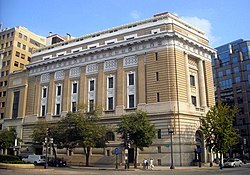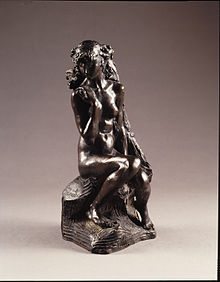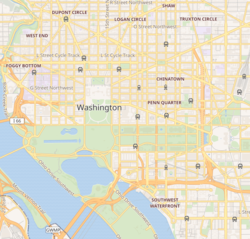National Women's Museum of the Arts
This article is about the museum in Washington, D.C.. For other uses, see NMWA (disambiguation).
United States historic place
| Masonic Temple | |
| U.S. National Register of Historic Places | |
 National Museum of Women in the Arts | |
| Show map of Central Washington, D.C. Show map of the United States | |
| Location | 1250 New York Ave NW Washington, D.C. |
|---|---|
| Coordinates | 38°54′0″N 77°1′46″W / 38.90000°N 77.02944°W / 38.90000; -77.02944 Coordinates: 38°54′0″N 77°1′46″W / 38.90000°N 77.02944°W / 38.90000; -77.02944 |
| Area | 0.3 acres (0.12 ha) |
| Built | 1903 |
| Architect | Wood, Donn & Deming |
| Architectural style | Classical Revival |
| NRHP referenceNo. | 86002920[1] |
| Added to NRHP | February 18, 1987 |
The National Museum of Women in the Arts (NMWA), located in Washington, D.C., is "the only major museum in the world solely dedicated" to celebrating women's achievements in the visual, performing, and literary arts.[2] NMWA was incorporated in 1981 by Wallace and Wilhelmina Holladay. Since opening its doors in 1987,[3] the museum has acquired a collection of more than 4,500 paintings, sculptures, works on paper, and decorative art. Highlights of the collection include works by Mary Cassatt, Frida Kahlo, and Élisabeth Louise Vigée-Le Brun. The museum occupies the old Masonic Temple, a building listed on the U.S. National Register of Historic Places.
History [edit]
The museum was founded to reform traditional histories of art. It is dedicated to discovering and making known women artists who have been overlooked or unacknowledged, and assuring the place of women in contemporary art. The museum's founder, Wilhelmina Cole Holladay, and her husband Wallace F. Holladay began collecting art in the 1960s, just as scholars were beginning to discuss the under-representation of women in museum collections and major art exhibitions. Impressed by a 17th-century Flemish still life painting by Clara Peeters that they saw in Europe, they sought out information on Peeters and found that the definitive art history texts referenced neither her nor any other woman artist. They became committed to collecting artwork by women and eventually to creating a museum and research center.
The National Museum of Women in the Arts was incorporated in December 1981 as a private, non-profit museum, and the Holladay donation became the core of the institution's permanent collection. After purchasing and extensively renovating a former Masonic Temple, NMWA opened in April 1987 with the inaugural exhibition "American Women Artists, 1830–1930". To underscore its commitment to increasing the attention given to women in all disciplines, NMWA commissioned Pulitzer Prize-winning composer Ellen Taaffe Zwilich to write Concerto for Two Pianos and Orchestra inspired by five paintings from the permanent collection, for an opening concert. In November 1997, the Elisabeth A. Kasser Wing was opened, adding two new galleries, a larger museum shop, and a reception room. Currently, Director Susan Fisher Sterling heads a staff of more than 30 people.
Building [edit]
In 1983, NMWA purchased a landmark 78,810 square feet (7,322 m2) former Masonic temple in the Renaissance Revival style to house its works. After extensive renovations that included the addition of the two dramatic marble stairways linking the first floor and mezzanine, the museum opened to the public on April 7, 1987. The Elizabeth A. Kasser Wing opened November 8, 1997 making the entire facility 84,110 square feet (7,814 m2).

Interior of the main floor
Wilhelmina Cole Holladay [edit]
Wilhelmina Cole Holladay was the founder and chair of the Board of the National Museum of Women in the Arts. Since her discovery that women artists have historically been omitted from collegiate art history texts, Wilhelmina Cole Holladay made it her mission to bring to the forefront the accomplishments of women through collecting, exhibiting and researching women artists of all nationalities and time periods.
Holladay created individual committees of over 1,000 volunteers from 27 states and 7 countries, to give educational opportunities to children through collaborations with schools and other community groups (e.g. Girl Scouts of the USA), as well as provided opportunities for adults to participate and encourage art in local communities across the globe.
Wilhelmina Cole Holladay's interest in art was sparked as a student at Elmira College in New York, where she studied art history, followed by graduate work at the University of Paris. She is listed in Who's Who of American Women, Who's Who in American Art, Who's Who in the World, and she holds many honorary degrees and achievement awards for her work in the arts community. In 2006 she received the National Medal of Arts from the United States and the Légion d'honneur from the French government. In 2007 Holladay received the Gold Medal for the Arts from the National Arts Club in New York City.
New York Avenue Sculpture Project [edit]
The museum sponsored a series of installations on New York Avenue in Washington, DC from 13th Street to 9th Street, in the heart of Mount Vernon Square. The point of the effort was to bring "character" to an area where "there is a lot of good stuff going on," due to revitalization programs in the neighborhood.
Niki de Saint Phalle's works, four in total, were the first in a series of installations.[4] The installation of de Saint Phalle's iconic pop art works was meant as a contrast to the traditional sculpture that graces the streets and squares of Washington. All five major median strips were made into "sculpture islands," as described by National Museum of Women in the Art's director Susan Fisher Sterling. Another inspiration for the project came from the lack of innovative contemporary art in Washington, encouraging the evolution of the area.[4] The second artist to be featured, whose works were on display March 8, 2012 – March 9, 2014, was Chakaia Booker.[5]
The project was sponsored by Medda Gudelsky, the D.C. Downtown B.I.D., the Philip L. Graham Fund, the Homer and Martha Gudelsky Family Foundation, members of the museum, and the D.C. Department of Transportation.[6]
The works remained up for one year.[7]
Collection [edit]

The collection currently contains more than 4,500 works in a variety of styles and media, spanning from the 16th century to present day. Among the earliest works is Lavinia Fontana's Portrait of a Noblewoman, ca. 1580. There are also a number of special collections, including 18th-century botanical prints, works by British and Irish women silversmiths from the 17th–19th centuries,[8] and more than 1,000 unique and limited edition artists' books.[9]
Nearly 1,000 artists are represented, including Magdalena Abakanowicz, Lynda Benglis, Rosa Bonheur, Chakaia Booker, Louise Bourgeois, Lola Alvarez Bravo, Rosalba Carriera, Mary Cassatt, Elizabeth Catlett, Judy Chicago, Camille Claudel, Louisa Courtauld, Petah Coyne, Louise Dahl-Wolfe, Elaine de Kooning, Lesley Dill, Helen Frankenthaler, Sonia Gechtoff, Marguerite Gérard, Nan Goldin, Nancy Graves, Grace Hartigan, Frida Kahlo, Angelica Kauffman, Käthe Kollwitz, Lee Krasner, Justine Kurland, Bettye Lane, Marie Laurencin, Hung Liu, Judith Leyster, Maria Martinez, Maria Sibylla Merian, Joan Mitchell, Gabriele Münter, Elizabeth Murray, Alice Neel, Louise Nevelson, Sarah Miriam Peale, Clara Peeters, Lilla Cabot Perry, Jaune Quick-to-See Smith, Rachel Ruysch, Elisabetta Sirani, Joan Snyder, Lilly Martin Spencer, Alma Thomas, Suzanne Valadon, and Élisabeth-Louise Vigée-Le Brun.
Betty Boyd Dettre Library and Research Center [edit]
The Betty Boyd Dettre Library and Research Center (LRC) provides researchers with information about women visual artists from all time periods and nationalities.[10] It is open to scholars, students, researchers, curators, museum professionals, and the general public. The LRC collection includes 18,500 volumes of books and exhibition catalogues, 50 periodical titles, and research files on 18,000 individual women artists. These files include resumes, correspondence, reproductions, articles, and other ephemeral materials. The Arts and Entertainment Network Media Library holds approximately 500 videos, DVDs, audio tapes, and other audiovisual materials, including examples of video art, interviews with women artists, documentaries, and films directed by women.
Also available to researchers are The Nelleke Nix and Marianne Huber Collection: The Frida Kahlo Papers consists of more than 360 unpublished letters, postcards, notes, clippings, printed matter, and drawings relating to the artist's life and work.
In spring 2007, the LRC launched "Clara: Database of Women Artists," a user-friendly searchable interface for biographic information on close to 18,000 historic and contemporary women artists from around the world. Since integrated within the NMWA web site, Clara has been decommissioned and is in the process of being moved.
Exhibitions [edit]
Beginning in 1987 with American Women Artists, 1830–1930, NMWA has presented more than 200 exhibitions. A selection of the most prominent exhibitions includes:[11] [12]
- Loïs Mailou Jones: A Life in Vibrant Color (Oct. 9, 2010–Jan. 9, 2011)
- Royalists to Romantics: Women Artists from the Louvre, Versailles, and Other French National Collections (Feb. 24–Jul. 29 2012)
- An Imperial Collection: Women Artists from the State Hermitage Museum (Feb. 14, 2003 – June 18, 2003)
- Women Who Rock: Vision, Passion, Power (Sep. 7, 2012–Jan. 6, 2013)
- Places of Their Own: Emily Carr, Georgia O'Keeffe, and Frida Kahlo (Feb. 8, 2002 – May 12, 2002)
- The Magic of Remedios Varo (Feb. 10, 2000 – May 29, 2000)
- Julie Taymor: Playing With Fire (Nov. 16, 2000–Feb. 4, 2001)
- WACK! Art and the Feminist Revolution (Sep. 21, 2007–Dec. 16, 2007)
- Dreaming Their Way: Australian Aboriginal Women (Jun. 30, 2006–Sep. 24, 2006)
Public programs [edit]

Wikipedia edit-a-thon held at the museum in 2014
NMWA hosts educational programs for all age groups to teach the public about the artistic accomplishments of women. Programs include monthly Community Days[13] with free museum admission, and Role Model Workshops that connect teenagers with accomplished women working in the art world. Member days include curator- and artist-led tours. The Education Department is also involved in various outreach programs to area educators. For example, the 2010 "Teachers Connect" program was designed around the promotion of NMWA's Art, Books, and Creativity curriculum.
The free Shenson Chamber Music Concerts support the museum's mission of recognizing women in all areas of the arts by featuring woman musicians throughout the year. Past performers include the Ahn Trio, Arianna and Eugenia Zuckerman, Ingrid Fliter, Sharon Ibsin and Rachel Barton Pine. NMWA's literary programs showcase women writers by bringing in authors such as Susan Vreeland, Lisa See, Maxine Hong Kingston, Naomi Shihab Nye, Joyce Carol Oates, and Mireille Guiliano. In addition, NMWA has offered film screenings of works by respected women directors and screenwriters including Maya Angelou, Barbara Hammer, Cheryl Dunye, Eva López Sánchez, Miranda July, Bette Gordon, and Julie Taymor.
Operations [edit]
The museum is located at 1250 New York Avenue and H Street N.W. The closest Washington Metro stations are Metro Center or McPherson Square stations. The museum is open Monday–Saturday 10 a.m.–5 p.m. and Sundays noon–5 p.m. Admission is $10 for adults, $8 for students and visitors 65 and over, and free for members and visitors 18 and under. Admission is free to all on the first Sunday of every month. The NMWA Museum Shop is open the same hours at the Museum.
See also [edit]
- House of the Temple, another Masonic Temple building on 16th Street, nearby
- New Hall Art Collection
- Women artists
References [edit]
- ^ "National Register Information System". National Register of Historic Places. National Park Service. March 13, 2009.
- ^ "About". National Museum of Women in the Arts. Retrieved September 12, 2016.
- ^ "Our History – National Museum of Women in the Arts". nmwa.org . Retrieved 4 August 2017.
- ^ a b Jacqueline Trescott (February 24, 2010). "National Museum of Women in the Arts to turn D.C. corridor into sculpture alley". Style. The Washington Post. Retrieved 8 Feb 2011.
- ^ Orin Zahra (March 7, 2012). "Chakaia Booker: Evocative, Dynamic Works in the New York Avenue Sculpture Project". National Museum of Women in the Arts.
- ^ Michelle Cragle (2010). "National Museum of Women in the Arts Announces Sculpture Project". Press Center. Niki Charitable Art Foundation. Archived from the original on 2010-03-06. Retrieved 8 Feb 2011.
- ^ Blake Gopnik (April 28, 2010). "Sculptures add color to New York Avenue, but are they art?". Style. The Washington Post. Retrieved 8 Feb 2011.
- ^ "Collection Highlights – National Museum of Women in the Arts". nmwa.org . Retrieved 4 August 2017.
- ^ "Library & Archives – National Museum of Women in the Arts". www.nmwa.org . Retrieved 4 August 2017.
- ^ "Library & Archives – National Museum of Women in the Arts". www.nmwa.org . Retrieved 4 August 2017.
- ^ "Exhibitions – National Museum of Women in the Arts". nmwa.org . Retrieved 4 August 2017.
- ^ "Exhibition History (1987–2013)" (PDF). National Museum of Women in the Arts. Archived from the original (PDF) on 8 March 2013. Retrieved 29 March 2013.
- ^ Visitor information from NMWA
External links [edit]
![]() Media related to National Museum of Women in the Arts at Wikimedia Commons
Media related to National Museum of Women in the Arts at Wikimedia Commons
- Official website
National Women's Museum of the Arts
Source: https://en.wikipedia.org/wiki/National_Museum_of_Women_in_the_Arts


0 Response to "National Women's Museum of the Arts"
Post a Comment